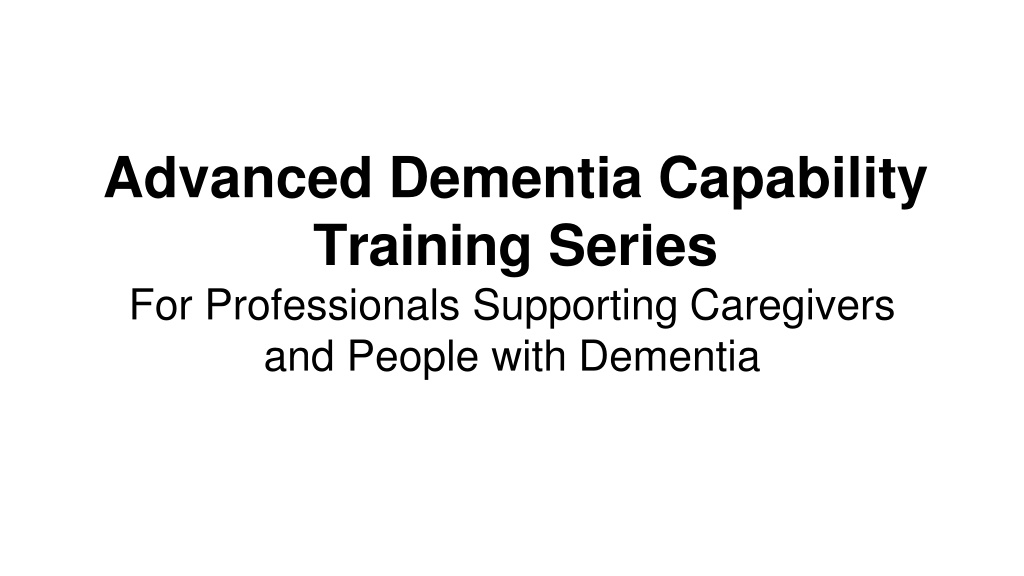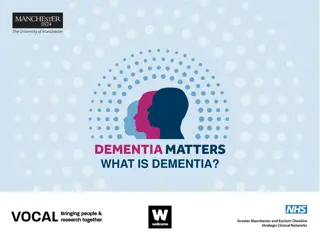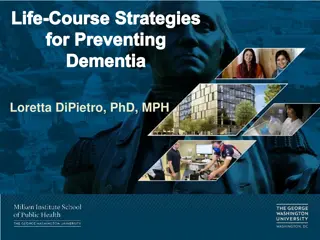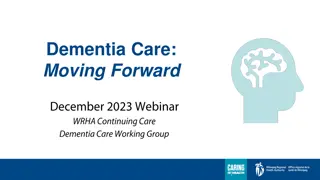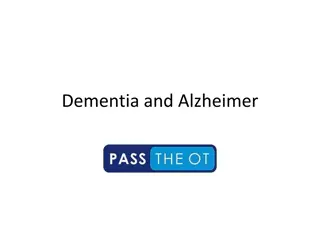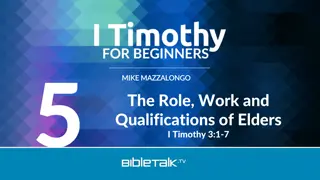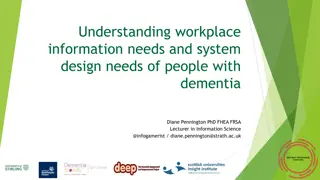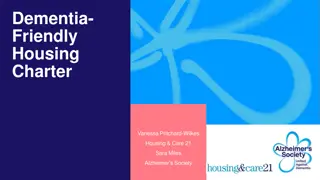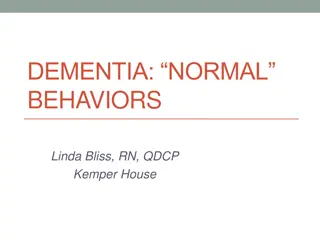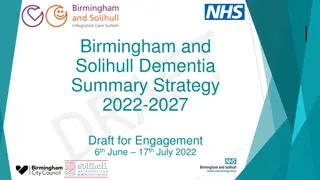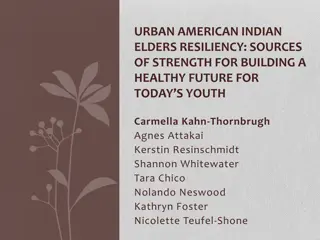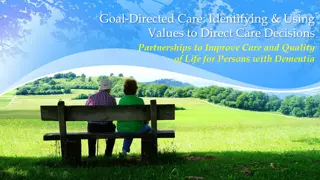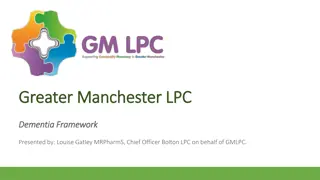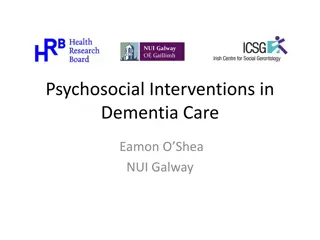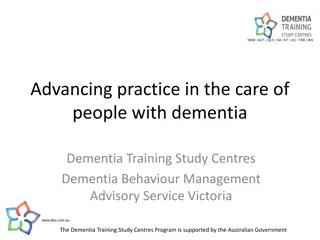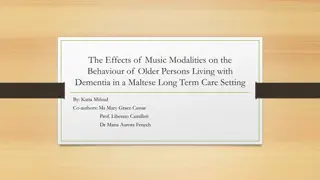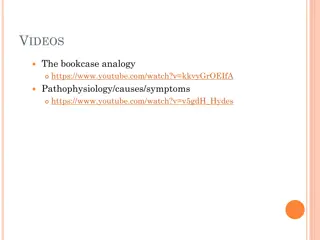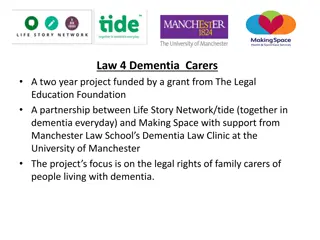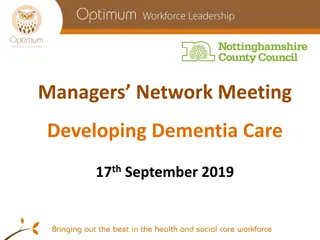Cultural Awareness in Dementia Care for African American Elders
This training series focuses on the historical impacts and cultural considerations in dementia care for African American elders. It covers the unique perceptions of dementia, effective caregiver strategies, and the importance of understanding historical experiences for improved interactions with the healthcare system.
Download Presentation

Please find below an Image/Link to download the presentation.
The content on the website is provided AS IS for your information and personal use only. It may not be sold, licensed, or shared on other websites without obtaining consent from the author. Download presentation by click this link. If you encounter any issues during the download, it is possible that the publisher has removed the file from their server.
E N D
Presentation Transcript
Advanced Dementia Capability Training Series For Professionals Supporting Caregivers and People with Dementia
Cultural Awareness in Dementia Care: Working With African American Elders Dorothea Harris MSW-LICSW Program Manager Volunteers of America MN/WI
Objectives At the end of this session participants will be able to: Describe at least 2 impacts of the historical experience of African American elders and how they may be related to interactions with the health care system. Explain the African Americans perceptions of dementia that may be different from those of other cultural groups. State the importance of helping African American caregivers understand the Vascular dementia and the link to a dementia diagnosis. Compare the concepts of equality and equity and describe how they are different. List ways Caregiver Consultants can be effective when working with African American elders and their families.
Module1 Ten Warning Signs and Symptoms Subtle Gradual Changes
Subtle Gradual Changes Source: https://www.google.com/search?q=alzheimer%27s+disease+early+diagnosis+and+treatment&source=lnms&tbm=isch&sa=X&ved=0ahUKEwjI8vW89sLVA hVH4oMKHZ5iCmEQ_AUICygC&biw=1006&bih=587#imgrc=xv-EhWbAx9XibM:
Ten Warning Signs and Symptoms of Alzheimer s 1. Confusion with time or place 2. Memory loss that affects daily life 3. Trouble with completing daily tasks 4. Trouble with visual images/spatial relationships 5. Difficulty with planning or solving problems 6. New problems with words 7. Withdrawing from usual activities 8. Misplacing things 9.Changes in mood or personality 10.Poor judgment or decision-making Source: www.alz.org
Module 2 Cultural Context: Historical Impacts
Historical Impacts Old wounds heal slowly- The Tuskegee Experiment Picture courtesyof: http://www.cnn.com/2010/HEALTH/10/01/guatemala.syphilis.tuskegee/index.html
Historical Impacts Growing up within a segregated health care and social services system Use of home remedies and herbs an important component of health care Faith community may inform health care beliefs and behaviors
Historical Impacts Cont Chronic conditions of stress wreak havoc on mind and body Repeated traumatic events wreak havoc on the mind and body Stress equals cognitive decline Race-based stress
Module 3 Perceptions about Dementia and Cultural Considerations
Perceptions About Dementia Belief that memory issues are normal part of aging Stigma of dementia similar to that of mental illness Caring for elders is normal Families learn to be resourceful Institutionalization is last resort http://www.redorbit.com/news/health/1112820310/african-americans- double-alzheimers-risk-gene-mutation-041013/
Cultural Considerations Find solace in religion Families use faith and spirituality as a coping resource Church is an all-inclusive support network African Americans often describe their churches as church homes and church families
Cultural Considerations Responsibility to care for one another Resistance to outside assistance Picture source: Projectcasting.com
Cultural Considerations Community may see the formal and white health care system as part of an overall oppressive system Elder and family may be on alert and on guard; may be biased when they share with formal caregivers
Module 4 African American Caregivers: Understanding Vascular disease as it relates to a Dementia Diagnosis
Hard Hit by Alzheimers Disease African- Americans have the highest risks for Alzheimer s than any racial or ethnic group Picture source: https://www.pinterest.com/pin/68046644348517787/
Hard Hit by Alzheimers Disease Medical risk factors include: Hypertension Stroke Diabetes Obesity High cholesterol Lack of access to exercise and nutritious foods
Why Not a Diagnosis? Reasons may include: Fear Stigma Belief that memory issues are part of normal aging Lack of insurance coverage Cost of the evaluation Distrust of medical system
Rule Out Co-Morbidities Co-morbid conditions are more common in AfricanAmericans Known for as the number one contributing risk factor for AfricanAmericans Health professionals/educators needs to emphasize the correlation of rule out conditions as being controllable
Module 5 Equality and Equity: Cultural Competence versus Cultural Humility
Equality and Equity http://valuingpeople.org.au/the-resource/what-is-person-centered-care
Equality and Equity Health equity means everyone has the opportunity to obtain their highest level of health
Cultural Competency vs Cultural Humility Cultural Humility is a lifelong process Cultural Competency implies this is the end product
Cultural Competency Implies: Competency Academic All knowing All powerful Promotes stereotypes Institutionalization of cultural knowledge Diverse populations follow traditions
Cultural Humility Implies: No certification or class Open to learning Promotes respect Supports traditions Listening Flexibility Acceptance
African American Community Protective Factors and Risk Factors
African American Community Protective Factors: Strong sense of community Spirituality and resilience Family Loyalty Respect for the elderly
African American Community Risk Factors: Systemic racism Distrust of institutions Takes time to build relationship Health and economic disparities Recommended: Harvard Implicit Association Test: https://implicit.harvardedu/
Module 6 Skills for Effective Caregiver Consultants: Preferred Services & Recommended Resources
Skills for Effective Caregiver Consultants Focus on using strengths perspective & cultural strengths Show respect for elders; put them at ease and take time to establish rapport Acknowledge, affirm, accept
Skills for Effective Caregiver Consultants Be aware of lasting impacts of historical trauma, oppression, structural racism and exclusion Be a resource to connect families to health care and social services that are culturally sensitive Understand your own inherent and subconscious biases
Interview with Dr Kevin Brown https://www.youtube.com/watch?v=HoyqvCHB5Z0&featur e=youtu.be
Resources Caregiver Services for African American Families | Volunteers of America https://www.voamnwi.org/caregiver-services-afam Culture Care Connection (online learning and resources center) Supporting health care providers, staff, and administrators in providing culturally competent care in Minnesota. Think Cultural Health (web-based resources and tools for cultural and linguistic competency) Advancing health equity by developing and promoting culturally appropriate services across public health and health care systems. Cultural Competence (condensed guide) Understanding a group's diversity, history, culture and contemporary reality toward providing culturally responsive dementia care.
This project is supported, in part by grant number 90AL0007- 01-00 from the U.S. Administration for Community Living, Department of Health and Human Services, Washington, D.C. and the Minnesota Board on Aging, St Paul, MN. Grantees undertaking projects under government sponsorship are encouraged to express freely their findings and conclusions. Points of view or opinions do not, therefore, necessarily represent official Administration for Community Living or Minnesota Board on Aging policy.
